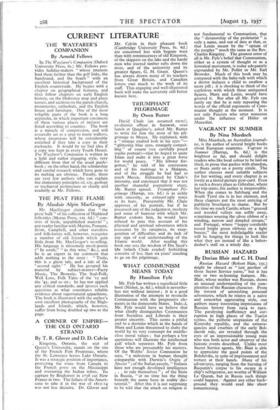WHAT COMMUNISM MEANS TODAY By Hamilton Fyfe
Mr. Fyfe has written a superficial little book (Nisbet, 3s. 6d.), which is neverthe- less not without interest ; it is a good illustration of the attempts to reconcile Communism with the progressive ele- ments in the democratic States. Indeed, Mr. Fyfe would have us believe that what chiefly distinguishes Communists from Socialists and Liberals is their greater sincerity. This seems a pitiful end to a doctrine which in the hands of Marx and Lenin threatened to shake the world by its very contempt for middle- class moral values ; but perhaps a few quotations will illustrate the intellectual gulf which separates Mr. Fyfe from those who are presumably his masters. Of the Webbs' Soviet Communism he says, " a milestone in human thought comparable with Darwin's Origin of Species " ; of the Italian people, " Italians have not enough developed intelligence . . . to rule themselves " • of the State in Russia, " at no time bas the thing beneath the name • been -in reality '-dic- tatorial." After this it is not surprising to be told that the attack on religion is
not fundamental to Communism, that the " dictatorship of the proletariat " is only a name, and out of date at that, or that Lenin meant by the " opium of the peoples " much the same as the Rev. Charles Kingsley. The greatest error of all is Mr. Fyfe's belief that Communism, either as a system of thought or as a historical movement, is today adequately expounded by Mr. Pollitt or Mr. Earl Browder. Much of this book may be. compared with the baby-talk with which a doctor induces a child to swallow a nasty pill ; it is shocking to think of the expletives with which those antiquated figures, Marx and Lenin, would have greeted it. But after all Mr. Fyfe can justly say that he is only repeating the words of the official exponents of Com- munist thought at the moment. It is' not only Fascists who utter nonsense under the influence of Hitler or Mussolini.






































 Previous page
Previous page